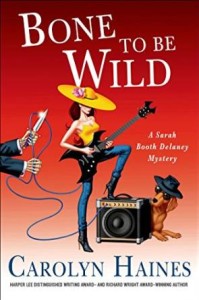by Carolyn Haines, @DeltaGalCarolyn
In real estate, the old saw is that location is everything. For me, the same is almost always true in fiction. My reading and writing preference is that the characters are either organic to the setting, or they are fish out of water. Either choice provides the reader with a unique view of the story’s setting.
Growing up in Mississippi, I’m well aware of the rich heritage of writers from my home state. Eudora Welty, William Faulkner, Tennessee Williams—they have imprinted an image of Mississippi on multiple generations of readers and writers. My experiences were very different. I grew up during the turmoil of the 60s and 70s. My parents were journalists who believed in civil rights at a time when that wasn’t the most popular stance. So I grew up loving the incredible woods and creeks of a state blessed with natural beauty, but saddened by the willful ignorance and sometimes the pure damn meanness. It is this rich diversity that makes Mississippi such a perfect setting for novels: the very poor and very wealthy, the pine barrens and sandy beaches of the Gulf, the good-hearted and kind, and those who are not. I grew up knowing all of it. And all of it comes out in the characters I write about.Continue reading


